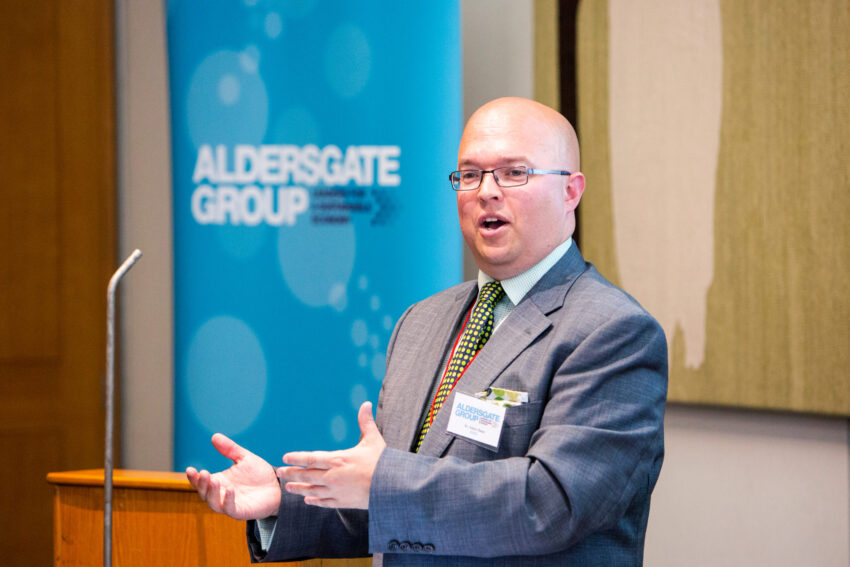AG INSIGHT | 12/12/2018
I’m dreaming of a Green Christmas

Dr Adam Read, Director of External Affairs at SUEZ, discusses key policy priorities for a strong upcoming Resources and Waste Plan
December is quickly passing by and Defra is running out of days to publish its Resources and Waste Plan (RWP) and associated consultations on the introduction of a Deposit Return Scheme (DRS), changes to the Extended Producer Responsibility (EPR) scheme for packaging, future packaging recycling targets and on the consistency of materials collected into circulation. Brexit has derailed many things his year, but it won’t derail Christmas, at least not in my house…
The word on the street is that the RWP is likely to be out the week beginning 17th December (although the vote of no confidence in the Prime Minister may yet delay this until January 2019) with both the Rt Hon Michael Gove MP and Dr Thérèse Coffey MP facing the Environmental Audit Committee on the 19th. But the proof of the pudding remains in the eating and that analogy works just as well for a Christmas pudding as it does for the long-awaited RWP. What will it taste like and will there be a surprise or two hidden in amongst the fruit?
Given SUEZ’s engagement over the past nine months on the Plan with Defra and other key stakeholders, hopefully our wish list for a Green Christmas might not be too far from the mark. So what do I want to see in the RWP and associated consultations?
Strategic leadership: the Plan must bring together a range of existing policy commitments, from the 25 Year Environment Plan to the Clean Growth and UK Industrial Strategies. It must offer a long-term vision and a series of pragmatic steps and action plans. This is a once in a generational opportunity to get things right, so we must fully embrace it!
EPR reform: not only have Defra ministers alluded to this on many occasions, but it also featured in the Budget, so expectations are high. SUEZ has hosted numerous workshops and engaged with Defra on this, and my hope is that they look for 90% or greater full cost recovery from producers for the costs incurred in managing their packaging. This will generate potentially an additional £1bn in funds to capture, harvest and recycle obligated materials, providing much needed income for local authorities who have been subsidising this system for the last 20 years. The real detail of the options under consideration will be subject to consultation but I hope to see some indication of how the new system is expected to meet higher recycling targets expected by 2035, and how the money will flow from producers to those responsible for collecting the materials, processing and refining them prior to recirculation. This will be one of the more contentious issues in the RWP and needs a full and thorough airing in the New Year. And whilst the Budget set the agenda for building increased recycled content in our economy by proposing a new tax on packaging with less than 30% recycled content, we need Defra to re-inforce this demand driver and actively support UK market development (where appropriate) to ensure we decrease our reliance on overseas markets and build our commodity resilience.
Clarity on targets: I expect to see national targets adopted (or at least proposed) that match those within the Circular Economy Package (CEP) at a national level. What I would really like is for the consultation to focus on how these targets might be applied equitably to individual authorities in a way that better reflects their structural ability to recycle. I also hope that Defra looks pragmatically at how to meet these targets as 2025 is not far away and we have a lot to accomplish.
Thorough debate on consistent collections: and how EPR obligated materials are married with non-obligated items (like green or food wastes) to ensure suitable services and systems for all.
Acceptance of the role of energy from waste as an essential transition technology: moving wastes away from landfill whilst buying the sector time to secure appropriate technologies and the private finance needed to build this infrastructure.
Better and more robust data sets: data will be key in a reformed EPR world to help protect us from fraud and waste crime, and it will also underpin payments to a range of service providers who are ensuring packaging materials make their way back through any number of closed loops.
Now, that’s quite a Christmas list, but I have been waiting longer than just a year for this opportunity for reform and with Defra pushing hard I am optimistic it will deliver much of what the sector needs and has been demanding for some time now.
Dr. Adam Read is External Affairs Director at SUEZ Recycling & Recovery UK ltd.


